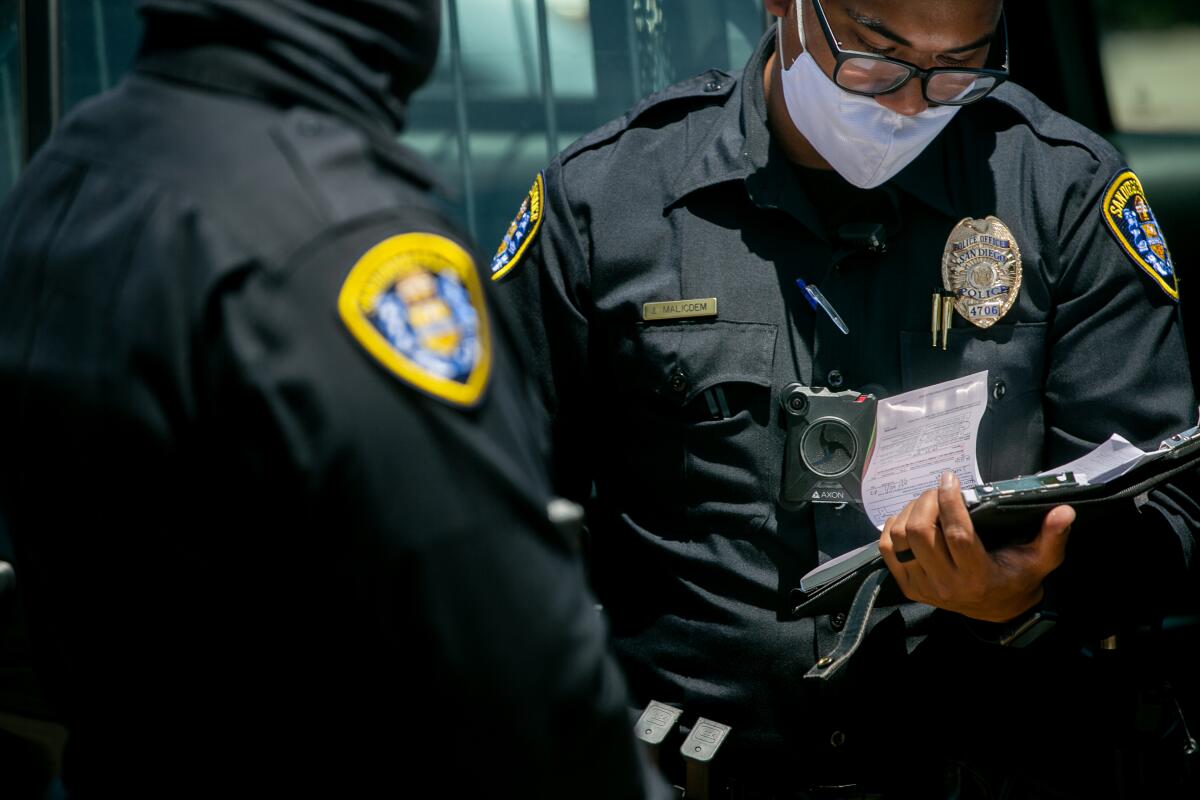The traffic ticket from hell

- Share via
Fatemeh was almost home. She was 19 and driving her 1994 Toyota Tercel down J Street in Sacramento. She didn’t realize she’d already made a mistake that would affect her life for years to come.
A police officer pulled her over for expired tags. And she had left her proof of insurance at home. She got two expensive traffic tickets — $285 for the registration and $900 for “failure to show a peace officer evidence of financial responsibility.”
Fatemeh — then a full-time college student who helped out at her family’s kebab cafe and grocery store — couldn’t pay the fines and she missed her court date, which together increased her penalties by $600 in “civil assessments,” plus some ancillary charges. When she made it to traffic court, she owed just over $1,800.
The judge wouldn’t convert her tickets to “fix-it” status, even though by then she could show proof of insurance and registration. Nor was her debt reduced. Instead, she was offered the option of performing community service.
Fatemeh agreed, but she began to crack under the pressure — “a mental health breakdown,” in her words. Ultimately, she couldn’t complete the community service and her traffic tickets were sent to a collection agency.
It only got worse. Fatemeh took an additional part-time job, but her new wages boosted her income high enough that she was no longer eligible for Medi-Cal coverage. She lost antidepressant prescriptions along with her ability to see a therapist. Eventually, she dropped out of college.
“I wouldn’t be in this mess if I had money,” she told me recently. She’s 25 now and still trying to pay off the citations.
Fatemeh’s “mess” is directly tied to California’s decision to fund court and government services by loading fees onto traffic tickets and other citations for misdemeanors and felonies. When you get a ticket for, say, a stop-sign violation, you won’t see the add-ons broken out, just a total that makes California traffic fines among the most expensive in the nation.
Take Fatemeh’s violations. The base fines are published in the state Judicial Council’s Uniform Bail and Penalty Schedules: $50 for lack of registration and $200 for no proof of insurance. Her legal aid attorney tracked down the add-ons, 10 of them, including hefty state and county “penalty assessments,” a charge for court construction, another for “emergency medical services,” the collection of DNA, night court and more.
The $600 in civil assessments added later to Fatemeh’s fines and fees are especially troubling. Californians get socked with these charges if they do not pay their tickets within 21 days and don’t appear as ordered in traffic court. Can you imagine if your utility or credit card bill doubled or tripled if you couldn’t manage to pay it on time?
And an inability to pay is common. So far in 2021 in San Francisco, an average of 3,000 traffic tickets a month have been issued, and about 1,100 late-payment civil assessments levied. In other words, about a third of those who got cited were charged late-pay assessments as well.
The upshot of all this is a regressive, two-tiered justice system. If you have money, you may complain about the high cost of a traffic ticket, but you pony up and move on. If you can’t afford to pay, like Fatemeh, the costs may bury you.
And the “poverty penalty” falls hardest on Black and brown people, who research shows are much more likely than white people to be pulled over for the same driving infractions.
This is a horrible way to fund government, and it doesn’t work to boot. According to one tally, Californians owe about $315 per capita in unpaid court fine-and-fee debt. The state Legislative Analyst’s Office noted in 2016 that “a large portion may not be collectable, as the cost of collections could outweigh the amount that would actually be collected.”
The Debt Free Justice California coalition has been sounding the alarm on the state’s fine-and-fee poverty trap for years. In his new budget, Gov. Gavin Newsom responded with a one-time $300-million forgiveness program for low-income Californians who owe fines and fees issued for traffic and nontraffic infractions between Jan. 1, 2015 and June 30, 2021. Such programs, however, have low takeup rates. People don’t hear about them and the application paperwork is a barrier.
We need solutions that permanently wipe out these fees. State Sen. Steven Bradford (D-Gardena) has introduced Senate Bill 586, which would eliminate a big chunk of the problem, wiping out 39 add-on fees, including civil assessments. It would also erase current outstanding fine-and-fee debt.
Unfortunately, the bill is stuck in the Senate Appropriations Committee. The committee chair, Anthony Portantino (D-La Cañada Flintridge), has until Friday to advance it or it will die.
California is looking at a $76-billion surplus this year. If Sacramento wants to put money in the pockets of those hit hardest by the pandemic — low-wage workers of color — SB 586 is a surefire way to do it. We can afford this fundamental reform that will build the racial and class equity our state desperately needs.
A traffic citation at age 19 shouldn’t be a ticket to years of financial distress.
Anne Stuhldreher directs the Financial Justice Project in the treasurer’s office of the city and county of San Francisco. She is a senior fellow in the Aspen Institute’s Financial Security Program.
More to Read
A cure for the common opinion
Get thought-provoking perspectives with our weekly newsletter.
You may occasionally receive promotional content from the Los Angeles Times.









